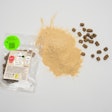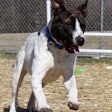Low-fat petfoods may provide health benefits to dogs with gastrointestinal disease, according to Dr. Jorg Steiner, associate professor in the Department of Small Animal Medicine and Surgery at Texas A&M University.
Lipids, water-insoluble molecules, have many crucial functions in dogs, specifically triglycerides and cholesterol. Dr. Steiner says that hypertriglyceridemia is common in dogs, but affects some breeds more than others, as some recent studies have indicated. In the study, 611 routine chemistry profiles in dogs were performed at a veterinary laboratory in Italy and evaluated; findings showed that 33 dogs (5.4 percent) showed hypertriglyceridemia. Another study tested 192 healthy miniature Schnauzers, finding that 63 (32.8 percent) had hypertriglyceridemia. According to Dr. Steiner, differentiating between primary or secondary hypertriglyceridemia can be difficult, but is based on exclusion of suspected risk factors of secondary hypertriglyceridemia, such as diabetes mellitus, obesity or pancreatitis, while primary hypertriglyceridemia is often associated with a higher breed-related frequency.
Dr. Steiner says the most important consequence of hypertriglyceridemia in dogs is pancreatitis, as supported by a study which found the risk of pancreatitis was nearly five times higher in miniature Schnauzers with severe hypertriglyceridemia (above 10,17 mmol/l or 900 mg/dl) than in the study's control dogs. Generally, treatment of hypertriglyceridemia is recommended when serum triglyceride concentrations are above 5.65 mmol/l (500 mg/dl), though there is little scientific evidence to support this, Dr. Steiner says. The primary therapeutic approach for treatment of hypertriglyceridemia in dogs is to feed a petfood diet that is low in fat (generally less than 20 grams of fat/1,000 kcal). A recent study of miniature Schnauzers whose hypertriglyceridemia was managed with a dietary change to a low-fat petfood found that none of the dogs had serum triglyceride concentrations that were above 500 mg/dl after the dietary change. Additionally, the liboprotein profile of the dogs changed after being switched to the low-fat food to more-closely resemble the liboprotein profile of a healthy dog.
Because the digestion of dietary fat is more complex than that of proteins or carbohydrates, dogs with a wide variety of gastrointestinal problems may show maldigestion or malabsorption of fat. So, Dr. Steiner says, decreasing the fat content in petfood may improve clinical signs in dogs.

















